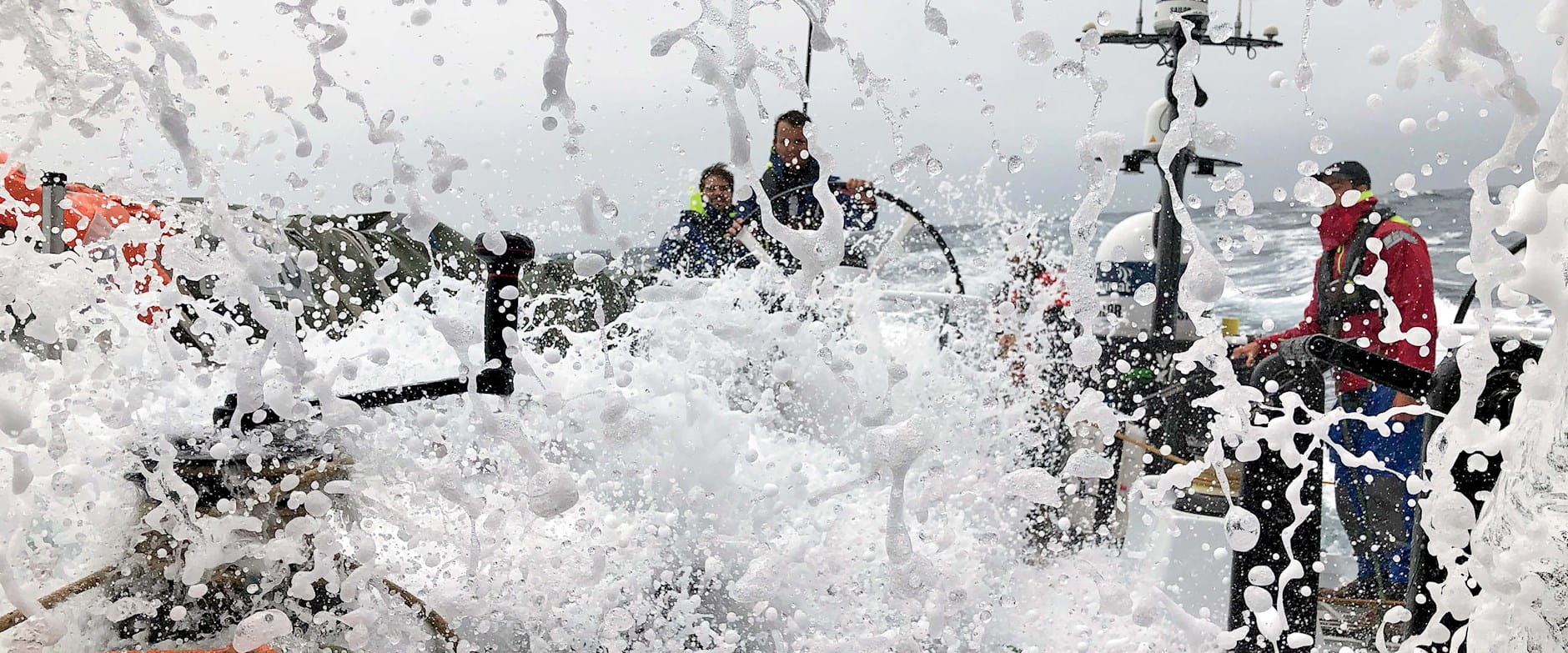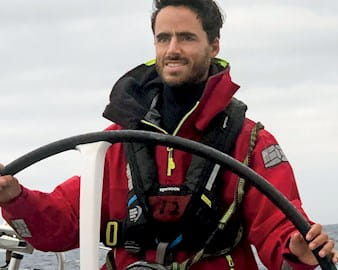
Scripting an Arts Business
Zeeshan Farooq, ’13, combines his lifelong love of calligraphy with management skills to produce art and communicate faith.
Scripting an Arts Business
Jen Edney
In July 2021, Juan Carlos Velasquez, ’15, got a call from a childhood friend with an enticing proposition. Erick, a professional sailor, needed one more person to join his team sailing across the North Atlantic Ocean. The voyage would raise money to back Erick’s entry into the Ocean Race, a competitive, high-performance sailboat race around the world.
Velasquez was busy building his Mexico and Colombia–based furniture and home décor marketplace, Alameda, and raising three kids under 5 with his wife, Maite. But he fondly pictured summers he and Erick spent sailing in Acapulco. He was excited about Erick’s goal of inspiring a new generation of Mexican athletes by putting together a mostly Mexican crew. And Velasquez himself had an adventurous streak—he’d climbed mountain peaks and was the fastest Mexican runner to finish the Boston Marathon in 2019.
So after a quick consult with Maite, he said yes.
He imagined sunny days at sea, and started packing shorts and T-shirts. But Erick stopped him. “He said, ‘No, you need a skiing jacket, long pants, gloves.’ That’s when I started to get worried,” Velasquez recalls.
He and fellow sailors approached their boat for the first time in a downpour in Bermuda. He got up to speed on the boat’s instruments and safety protocols on board. The cocaptain was frank about the perils of the journey: “He tells me, ‘Rule No. 1 is: if you fall in the water, you die.’”

That day was one of the hardest. “That first night, you’re a complete novice,” Velasquez says. “The feelings, the sounds, every experience is completely new, and it’s overwhelming.” Also humbling: not only was there no way to communicate with family and friends, but for 2,000 of the journey’s 3,000 nautical miles, the boat was unreachable by any rescue helicopter.
“You’re completely on your own,” he says. “That plays with your head a lot, knowing there’s no one there to save you.”
Velasquez and the 10 other sailors spent nine frigid, windy, rainy days changing sails and steering the boat as waves crashed around them. They slept in four-hour spurts, in sleeping bags damp from humidity. They ate freeze-dried food and didn’t shower for the entire trip.
About two-thirds of the way to their destination in Spain, the boat’s engine, which filters salt to make ocean water potable and powers the sailboat’s instruments, temporarily lost power. Loved ones from home who were following the boat’s progress online via GPS saw the ship come to a standstill on the map. It was a tense 48 hours both on the boat and at home.
“You’re completely on your own. That plays with your head a lot, knowing there’s no one there to save you.”
Velasquez took away countless lessons learned from his experience, especially from the cocaptain, Spanish sailor and former Olympian Chuny Bermúdez, who Velasquez fondly refers to as the Steve Jobs of sailing. Bermúdez’s saying, “When bad weather is coming, have the bunks full,” also applies to life and business, Velasquez says.
“Sometimes it’s time to recharge batteries,” explains Velasquez. “You have to be rested for when the storm hits.”
His favorite Bermúdez aphorism is: “It’s not the first mistake that kills you; it’s the second.” Even midstorm, when stakes were high, Bermúdez would remind the crew to pause and think about their solution, executing only once they had the right plan. “Impulsiveness can often mean death on the boat and in business,” Velasquez says.
Bermúdez also taught him boats sink not because of poor decisions made at sea, but because of those made on land before setting sail. It’s a lesson that can be applied to entrepreneurship too.
“Oftentimes, it’s not the market or the competition that kill you. It’s not having crucial elements such as product-market fit figured out before going out fundraising,” says Velasquez.
When Velasquez set foot in Spain, he was sleep deprived and physically exhausted. But he arrived with a greater appreciation for all of the small things in his life. “This experience put everything about life into perspective. It reminded me at a really deep level how fortunate we are, and that not living life to the fullest means sacrificing this gift,” he says.
The chance to break from his day-to-day changed him, both personally and professionally, for the better. “It’s really hard to step out of that routine and try something different,” he says, “especially if it involves a large degree of pain. But I truly believe that, within that pain and the walking into the unknown, that’s where the most valuable experiences and insights into life are.”

Zeeshan Farooq, ’13, combines his lifelong love of calligraphy with management skills to produce art and communicate faith.
Scripting an Arts Business
Alumnae and students came together to discuss making an impact at Booth’s first International Women’s Day Conference.
Getting Ahead with Purpose
The angel investor reflects on his Booth education and looks forward to the changes a new generation of students can bring.
The Book of Booth: Ron Tarrson, ’72 (XP-31)